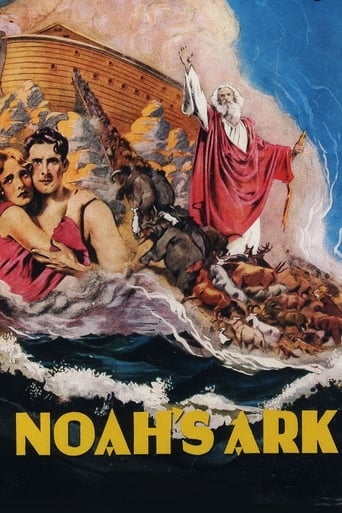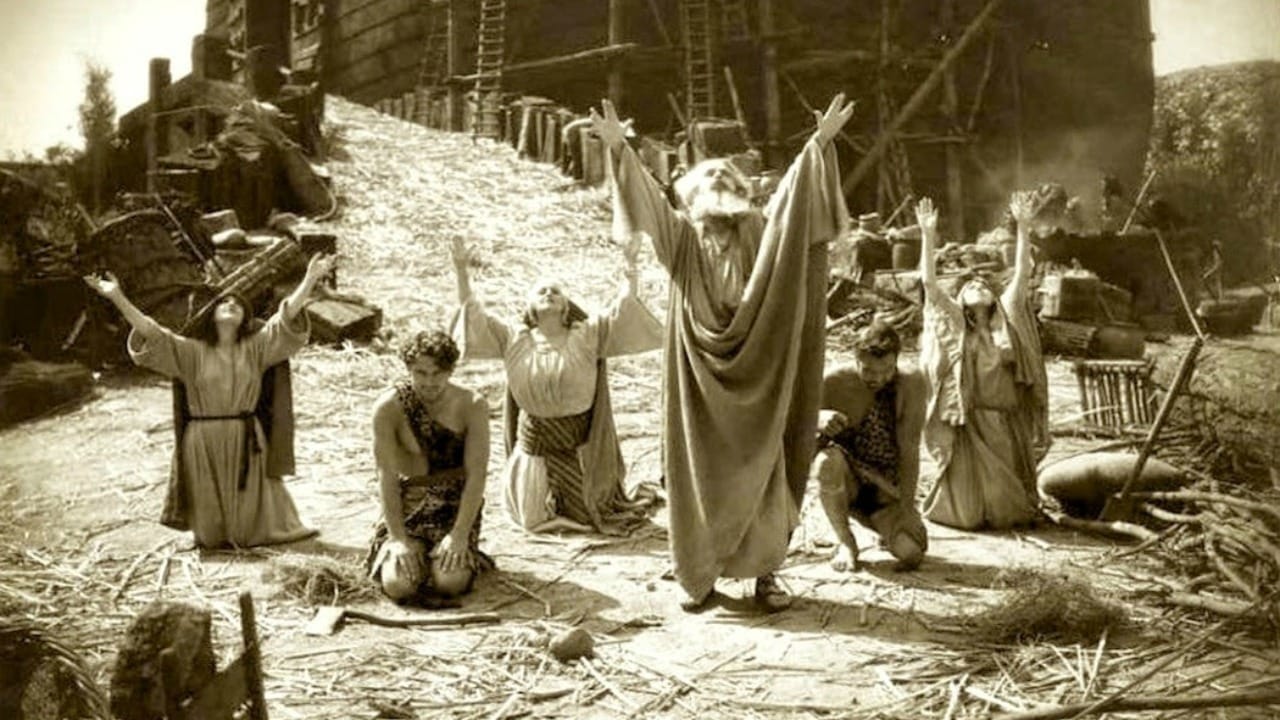JohnHowardReid
Copyright 28 May 1929 by Warner Brothers Pictures. Talking sequences and music score by Vitaphone. Hollywood premiere: 1 November 1928. U.S. release: 15 June 1929. Silent version released 27 July 1929. 11 reels. 9,507 feet. 105 minutes. (Silent version: 9,058 feet). New York opening at the Winter Garden: 12 March 1929. (Available on a superb Warner Archive DVD that runs an amazing 108 minutes). NOTES: Reportedly three extras drowned in the flood sequence, but these stories may be apocryphal. Certainly cinematographer Hal Mohr so objected to the extras being placed in danger, he walked off the set in protest and was replaced by Barney McGill.Negative cost was around $2 million, only part of which was recovered at the box-office, mainly due to extremely negative reviews.COMMENT: I think it fair to say that "Noah's Ark" is a typical example of the silent film spectacle. Masses of extras are often impressively marshaled in awesomely impressive sets and on the whole the action and "spectacle" scenes still evoke wonder and excitement.Curtiz's direction not only has verve and pace but moments of glory. The movie is by no means the total write-off derided by many contemporary critics. In fact, I wouldn't write it off at all except for the hammy performance of Paul McAllister. He is simply plain awful in the modern story, but as Noah he is not just awful but derisive, insulting and so highly offensive, one wonders how such a deliberately, wickedly inaccurate portrait ever got past even the most liberal-minded censor. The Bible itself presents Noah as a robust, strong-minded, fearless drinking man in the prime of life, not a sanctimonious old goat. Admittedly, the writers got the "fearless" right. And I can understand their reluctance at the height of Prohibition to present Noah as a drinking man, even though the Bible does so. God describes Noah as "righteous", not as sanctimonious. The Bible writers also go out of their way to tell us that Noah and his wife, and their sons and their wives were VEGETERIANS; Noah and his family did not eat any of the animals in the ark. It was only after the flood had subsided and because all vegetation had been destroyed that God relaxed this rule. So the clothes that Noah's sons wear are probably wrong too. They don't look like cotton garments to me.Nonetheless, despite the movie's title, Noah doesn't figure in the picture all that much. Aside from McAllister, I thought the players acquitted themselves well. However, I'm amazed the Warner Brothers were able to get away with their extremely negative view of the U.S. army and the movie's finger-pointing depiction of incompetent army brass not only at the climax but even earlier on in the story. No wonder the movie was soon hidden away and never re-issued in its complete version. REVIEWS from newspapers and magazines of 1929: "An idiotic super- spectacle with parallel Old Testament and Jazz Age sequences — Moses against Scott Fitzgerald... Widely conceded to be the worst picture ever made." — Alva Johnson, The New Yorker."A solid bore, with a very second rate war story in which everything from The Big Parade to date has been shabbily copied." — New York Post."You never saw so much rain in your life... A wet blanket — just plain awful." — Los Angeles Times."Frequently borders on the ridiculous... After sitting through this cumbersome production, one feels that it is a great test of patience." — Mordaunt Hall, New York Times.
mhesselius
This is a very disappointing effort by producer-writer Darryl F. Zanuck and Michael Curtiz in his American directorial debut. The film is obviously an attempt to replicate the DeMille formula of selling pre-code cheesecake in a biblical package. Which is OK if you have some original ideas. But this film has very little new to offer, and steals not only from DeMille, but from Rex Ingram's THE FOUR HORSEMEN OF THE APOCALYPSE and Frank Borzage's SEVENTH HEAVEN.The WWI story is blatantly derived from FOUR HORSEMEN, and carries over some of that film's problems. The idea that war can have a moral impact and yet remain immoral in the abstract doesn't cohere; and the portrayal of Travis (played by George O'Brien) and his buddy Al (played by Guinn Williams) as untroubled by moral misgivings about taking part in an apocalyptic war undercuts the anti-war message Zanuck seemed to be striving for.The maudlin sentiment - Al has a picture of "Mother" in his helmet - and facial mugging of the actors gives NOAH'S ARK the appearance of a film made ten years earlier. And the scene in the biblical section of a sightless Japheth divinely led to his lover Miriam (Dolores Costello) works no better than Charles Farrel's blind search for Janet Gaynor in SEVENTH HEAVEN.However, criticism of the incompatibility between the the modern and biblical sections is not valid. Both stories have apocalyptic themes; the comparison of God's decision to destroy "all flesh" in the flood, and the endgame specter of ten million dead in WWI would not be lost on audiences of 1929. Also the melodramatic tale of lust that leads the villain Nickoloff to condemn Travis' German wife to execution as a spy does roughly parallel King Nephilim's determination to sacrifice a virgin to an idol in the biblical section.More jarring than the parallel stories - or the ridiculous leopard skin costumes worn by Noah's sons - is the inclusion of spoken lines in the modern section. The actors' slow, careful, halting enunciation, and the drivel that come out whenever they open their mouths, kills the pace of the film and shows why Murnau believed the transition to sound was premature.The saving grace of the film is the spectacle of the ancient city and the flood itself, but the sets in the biblical section bear more than a little resemblance to the Babylonian sets in Griffith's INTOLERANCE, and the flood could not help but be realistic since Curtiz saw fit to let loose tons of water on extras who didn't know it was coming.
dbdumonteil
The conclusion of the movie leaves a bitter taste in the mouth .In his remake of his classic silent "J'accuse" (1937) ,Abel Gance too proclaimed universal peace.It was not to be the last of all the wars and men are still fighting at my time of writing.And there's another flood "in which we are engulfed which is more treacherous and persistent:the deluge of the mass production (and consummation)moves inexorably forward ,capturing everything that walks in whirlpools" of frozen food,rusted cars,DVDs and CDs,cans ,boxes ,hamburgers ,tons and tons of Bumf (papers) ,growing in an exponential way...Curtiz's movie was obviously intended to match the scale and quality (and commercial appeal)of De Mille'' "the ten commandments " .The structure is the same:a fine mixture of two stories ,a modern one (WW1,the deluge of blood)and a "biblical story" ,reversing De Mille's order .The connection between the two stories is perhaps tighter than in the 1924 work although in the first part of the movie the viewer may sometimes wonder what Curtiz is driving at.The biblical story has been " expanded " ,which was necessary for Noah's story is rather short and not particularly eventful if spectacular. Curtiz borrowed a lot from De Mille in the scenes of the deluge and when God "writes" to Noah (using thunderbolt).But his deluge is superior to John Huston's "the animals went in two by two" sequence in "The Bible" (1967)All in all,this is a very exciting show ,which features talking scenes ,including a whole version of "La Madelon" the Poilus' songs during WW1.The parade on the Champs D'Elysées with a painted Arc De Triomphe in the background and women throwing flowers when Travis sees Al marching on to war is a great moment.Melodrama reaches peaks of kitsch when the same is to execute ...his own wife ,condemned in mistake for spying.When will we see Noah's dove?
mcarlus
I remember watching "Noah's Ark" when I was 12 years old in 1962 in Brazil and fell in love with Dolores Costello... what a magnificent movie. I had never watched a Silent Movie... and was flabbergasted by it... by the sheer MAGIG of the images...Before the movie itself there was a little prologue showing "Noah's Ark"'s preview at the Chinese Theatre in Hollywood with red carpet and all... I think that predisposed me to be in awe with the whole thing.I loved it... but then NEVER heard of Dolore Costello or anything about the movie until the Internet Age came to the rescue...Carlus Maximus


 AD
AD


